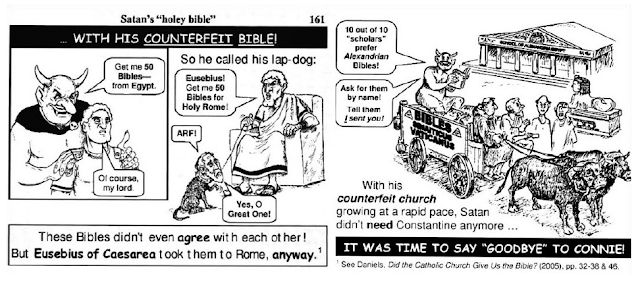Poor Eusebius: Always getting called a liar! Dan Barker's Misapplication of a Passage from Burckhardt
The fourth-century
Church father, Eusebius of Caesarea, is forever being given a bum-rap, whether it
be from King-James-Only fundamentalists on the one side or mythicist, historical-Jesus-denying
fundamentalists on the other.[1] The picture I chose to head this post comes
from the former type,[2] but the example I am going
to discuss from the latter type, in a book that makes the following claim:
Eusebius once wrote that it was a
permissible “medicine” for historians to create fictions—prompting historian
Jacob Burckhardt to call Eusebius “the first thoroughly dishonest historian of
antiquity.”[3]
On what authority
the author makes this statement is unclear, since he cites no specific reference
for either of the two claims. Perhaps we
are expected to accept what he says because he is, as the cover of his book proudly
announces, “One of America’s leading Atheists,” a claim, which, if true, doesn’t
speak well for the intellectual vigor of current American Atheism. However, to be fair, the basis for the cover’s
inflated claim may ultimately arise more from the book’s publisher’s hopes of boosting
sales of the book than from any objective comparative criteria for the ranking of
American Atheists.
In any case, as for the author’s first claim, i.e., about how Eusebius, “once wrote that it was a permissible ‘medicine’ for historians to create fictions,” we shall limit our response to a simple, unembroidered denial. In fact, Eusebius never wrote any such thing. Those who wish to pursue this erroneous mythicist commonplace further, will find that Roger Pierce over at www.tertulliain.org has done an excellent job getting to the bottom of it.[4]
Our interest here is
to provide a brief note of perspective regarding the author’s second claim concerning
the 19th century historian Jacob Burckhardt’s characterization of Eusebius
as “the first thoroughly dishonest historian of antiquity.” In fact, Burckhardt did say that, though not, as our author claims, in response to the remark
Eusebius never made about fictional history being good medicine.
Now, as is almost invariably the case for mythicists, our author’s appeal to Burckhardt represents a reliance on outdated scholarship. Such reliances are so typical that one might almost imagine that in order to be a mythicist one must also be allergic to current scholarship.
In Burckhardt’s
case we are dealing with a thesis about Constantine that would scarcely receive
the unqualified endorsement of Constantine scholars today. Burckhardt argued that Constantine was basically
a political animal top to bottom, that his friendly overtures toward the
Christian Church were largely a matter of political expediency, and, in fact,
that “throughout his life Constantine never assumed the guise of or gave himself
out as a Christian but kept his free personal convictions quite unconcealed to
his very last days.”[5] Burckhardt admits that although
he feels sure this is what Constantine was really like, the historical sources fail
to provide him with the evidence he needs to prove it.[6] And, of course, the centerpiece of those sources
were the works of Eusebius, and especially his Life of Constantine, which Burckhardt was reluctantly forced to
rely on all the way through his book. The
long and short of it, then, is that for Burkhardt’s thesis to work, Eusebius needed
to be a liar. Eusebius presented an impediment
to Burckhardt’s thesis, and, as a result, Burckhardt was perhaps a bit too keen
to discredit him. Consequently, although
some of his arguments did in fact touch upon real flaws in Eusebius’s telling
of Constantine’s story, he nevertheless went too far.
To be sure
Eusebius, in his enthusiasm over the favor Constantine showered on the Church, did
tend to undersell Emperor’s faults and oversell his virtues. But that’s always been a common thing for churchmen
to do when trying to stay in the good graces of the seat of power. One only need think, for example, of the lickspittle
first line of the dedication in the original 1611 King James Bible as a
parallel example:
Great and manifold were the blessings (most dreadful Soueraigne) with Almight GOD, the Father of all Mercies, bestowed upon vs the people of ENGLAND, when first he sent your Maiesties Royall person to rule and raigne ouer vs,” etc. etc., ad nauseam, in saecula saeculorum, amen.
As to the question of the sincerity of Constantine’s Christian faith, we face the same sort of ambiguity today when trying to decide whether to believe a particular American President or politician who says they are a Christian. On the one hand, if they behave badly, we may be inclined to count it as a proof positive that their confession is a sham. And certainly Burckhardt made that case in response to Constantine, just as many people today make the case in response to Donald Trump’s asseverations of personal Christian piety. Yet neither Constantine nor Trump acted as wickedly as any number of the “Christian” Kings of England, not least among them being King Henry VIII himself, the man through whom the title “defender of the faith,” first attached itself to the British throne. All this only goes to show that one can never really prove the absence of Christian confession by the presence of bad behavior. So ultimately one can only ask whether a politician claiming to be a Christian actually supported Christian causes, and this Constantine certainly did.
Branding Eusebius
a liar has a similar function as well for King-James-Only defenders who blame
Eusebius for corrupting the Bible (even though he never did) in order to establish
the superiority of the King James over more modern translations that are based upon
older and better manuscripts. So too, in the case of our leading atheist author,
the deployment of Burckhardt’s accusation also serves a purpose in terms of the
argument he is trying to make in the context.
As is typical of mythicists, he
is keen on clearing the deck of any possible early non-Christian witnesses to
the existence of Jesus. One such witness is the late first-century Jewish historian
Josephus, whose Antiquities contains the
following passage:
About this time there lived Jesus, a wise
man, if indeed one ought to call him a
man. For he was one who wrought
surprising feats and was a teacher of such people as accept the truth
gladly. He won over many Jews and many
of the Greeks. He was the Messiah. When
Pilate, upon hearing him accused by men of the highest standing amongst us, had
condemned him to be crucified, those who had in the first place come to love
him did not give up their affection for him.
On the third day he appeared to
them restored to life, for the prophets of God had prophesied these and
countless other marvellous things about him. And the tribe of Christians, so called after
him, has still to this day not disappeared.[7] (Italics added)
The majority of
scholars see this passage as basically authentic,but touched up with later
Christian interpolations—in particular the three items I have italicized. But mythicists
are eager to find ways of claiming that Josephus said nothing at all about
Jesus. Their usual method of trying to achieve this is to claim Eusebius made up
the entire passage up in the fourth century and then pretended he found it in Josephus.
Hence our author’s eagerness to repeat Burckhardt’s accusation. But there’s a problem.
In the context Burckhardt
wasn’t accusing Eusebius of falsifying excerpts of historical texts, but of falsely
spinning the story of Constantine to make him out to be a greater hero of the
Christian faith than he ever really was.[8] And indeed that is something that most
historians would grant to a degree.
It is quite a
different matter to imply from Burckhardt’s words that Eusebius was a willing
party to the invention of passages out of thin air. There is good reason to suggest he would not
do that. This is seen, for example, in the
fact that the quotations we aren’t sure of in Eusebius, passages from otherwise
lost works, or disputed passages such as this one, can be tested against the
host of other passages where he quotes from ancient works that are still
available.[9] His essential faithfulness
to his sources is perhaps seen most clearly in cases where Eusebius preserves passages
whose content conspicuously contradicts the interpretation he derives from them.[10]
© Ronald V.
Huggins 2/22/2019
[1] The idea of the
two groups as opposite ends of the same mindset is suggested by Maurice Casey
in his comments on our author, who is a convert to Atheism from Christianity:
[Dan
Barker’s] book is important to this discussion for one reason only: it can be
taken to show the damaging effect of the fundamentalist mindset upon attempts
at critical enquiry, that it can result in a merely different kind of preaching,
which still takes notice only of its own traditions” Jesus: Evidence and Arguments of Mythicist Myths (London: T&T Clark/Bloomsbury,
2014), 14.
The term “fundamentalist” is notoriously
slippery, as Alvin Plantinga amusingly pointed out when he noted that “On the
most common contemporary academic use of the term, it is a term of abuse or
disapprobation, rather like ‘son of a bitch’, more exactly ‘sonavabitch’, or
perhaps still more exactly (at least according to those authorities who look to
the Old West as normative on matters of pronunciation) ‘sumbitch’. When the term
is used in this way, no definition of it is ordinarily given. (If you called
someone a sumbitch, would you feel obliged first to define the term?) (Warranted Christian Belief Oxford: Oxford
University Press, 2000], 245). In using the term here, I am referring to a certain
intellectual rigidity, laziness, and intransigence that, when accompanied by an
overblown sense of self-confidence and certainty of one’s own views, ultimately
leads to a total contempt of and disregard for evidence. Such a mindset is by no means obviously connected
to one’s being theologically conservative or liberal, since examples of cases
of this mindset can readily be named from both camps. So in using the term I in
no way refer to the more nuanced perspectives reflected, for example, in J. I.
Packer’s “Fundamentalism” and the Word of
God (1958), in the more conservative side of the so-called Fundamentalist-Modernist
Controversy of the 1920s, represented by J. Gresham Machen’s Christianity
and Liberalism (1923), nor even in the range of views reflected in the originally
twelve-part and later four-volume collection published in the second decade of
the last century called The Fundamentals.
In each of these cases “Fundamentalism” primarily referred to an adherence to
the central tenets, or core beliefs of historic Christianity, the Regula Fidei, the endorsement of the historic
Creeds, Confessions and so on.
[2]David
W. Daniels, Babylon Religion: How a
Babylonian [G]oddess became the
Virgin Mary, (illustrated by Jack T. Chick; Ontario, CA. Chick Publications,
2006), 161.
[3] Dan Barker, Godless: How an Evangelical Preacher Became
One of America's Leading Atheists (fwd. Richard Dawkins; Berkeley, CA:
Ulysses Press, 2008), 255.
[4] http://www.tertullian.org/rpearse/eusebius/eusebius_the_liar.htm.
[5] Jacob Burckhardt,
The Age of Constantine (trans. Moses
Hadas; Garden City, NY: Doubleday Anchor, 956), 250.
[6] Ibid.
[7] Josephus, Antiquities 18.63.3
(ET: Louis H. Feldman, Josephus (volume 9 of 10; Loeb Classical Library;
Cambridge: Harvard University Press; London: Heinemann, 1965), 49 and 51.
[8] Burckhardt, Age of Constantine, 250.
[9]Sabrina Inowlocki, Eusebius and the Jewish Authors: His Citation
Techniques in an Apologetic Context (Leiden & Boston: Brill, 2006).
[10] For a measured survey of views on
and evaluation of Eusebius’s faithfulness in quotation, see Inowlocki, Eusebius and Jewish Authors, , 87-104.




Comments
Post a Comment